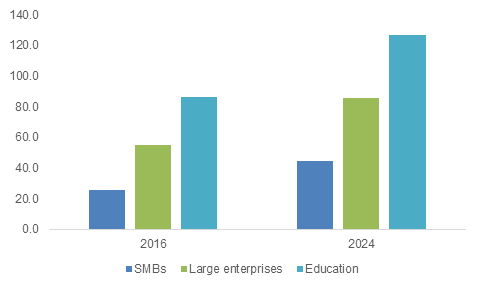- As part of these ongoing development efforts, TUC was required to provide betterU with validation that both their operating entity (TUC) and funding entity (GDS) had been established.
- TUC has provided betterU with copies of their Articles of Incorporation and Certificates for both TU Capital Ltd. and GDS Holdings Ltd.
- In addition, a copy of an HSBC bank statement was also provided to betterU validating that the Fund contributors had the capacity to support such an investment.
- This statement, provided under confidentially, included the bank name, account number, name of the account holder and a US$9 billion account balance
OTTAWA, Sept. 26, 2018 — betterU Education Corp. (TSX-V:BTRU) (FRANKFURT:5OGA) (the “Corporation†or “betterUâ€) would like to provide an update on the investment progress.
Brad Loiselle, CEO of betterU travelled to Tokyo, Japan from August 29th to September 7th where he had a series of meetings, including discussions with the management of TU Capital Co. Ltd. (“TUCâ€) from North America. TUC confirmed that the delay in them receiving investment funds by GDS Holding Ltd. (the “Fund†or “GDSâ€) had to do with an amendment restricting GDS from investing in certain countries. While this does not affect TUC’s investments into Canadian companies, it was a step that was unforeseen and currently being executed on this week according to TUC. Both TUC with GDS are expected back in Tokyo this upcoming next week to complete the necessary amendment. According to TUC, upon execution of this amendment, the funds will be released to them for distribution to their Canadian investments. There was no exact date provided by TUC to betterU indicating when the funds would be received other then a window of 7 days after the funds have been released to them.
The Chairman of TU Capital Ltd., Mr. Kenny Ho, writes, “We also wanted to apologize for the ongoing delays and the impact it has created for betterU. We had unfortunately underestimated the amount of work and associated timelines for the closing over the last year due to the many investments we are making in Canada and abroad. The overall delays have been due to the time and effort placed in building the GDS fund structure, setting up TUC’s operations and working with their Canadian partners while we continued to work with our global ones. We are now on the last phase of this long process and our investment team is working hard to complete the release of funds to betterU. These delays will in no way affect the US$100M equity investment or the agreed purchase price of US$3.00/share. betterU is an exciting company that continues to advance their efforts globally and we truly believe has the potential to be a positive change for emerging markets and the world.â€
As part of these ongoing development efforts, TUC was required to provide betterU with validation that both their operating entity (TUC) and funding entity (GDS) had been established. TUC has provided betterU with copies of their Articles of Incorporation and Certificates for both TU Capital Ltd. and GDS Holdings Ltd. In addition, a copy of an HSBC bank statement was also provided to betterU validating that the Fund contributors had the capacity to support such an investment. This statement, provided under confidentially, included the bank name, account number, name of the account holder and a US$9 billion account balance. TUC has also agreed to provide betterU with validation of funds received for distribution to betterU upon release from GDS.
Additionally, no insiders, including new appointments of betterU, will trade their shares until closing of this transaction.
The following transaction is still subject to shareholder and TSX-V approval.
Solving one of the world’s largest educational challenges and being able to provide those in need with access to global education is betterU’s core focus. ‘Access’ for people in emerging markets can improve the lives of millions of people helping lift them out of poverty. Over the last 5 years, betterU has focused on putting in place all the plans, partnerships and infrastructure to support such as vision. “As for the $100M investment, while this can and will be an important part of our business acceleration, it does not define us as a business, nor should it ever take away from what we are working to accomplish. Our purpose is to make a difference in the lives of millions and our focus remains locked on this vision,†said Brad Loiselle, President and CEO of betterU.
While revenue is a critical part of sustainability, it has not been part of the Company’s development priorities. The foundation of its platform, partnerships and technology was required to be completed to support the Company’s market security, vision and future revenue plans.  With only a small core team, betterU has had to focus on the bigger picture, which has required the ongoing support of investments as well. To understand the development scope and logic of betterU’s underlying plans on January 3rd, 2017 Mr. Loiselle wrote and published a white paper titled Equalizing Education for all – Building the future value of Ed-Tech which walks the reader through his strategies on how to build a stronger, more valuable Ed-Tech company that in the long-term, could become a market leader. “There are no short-cuts to solving this massive global problem and as with any business, there will continue to be ups and downs, delays, ongoing requirements for cash, turnover of staff and many other issues and opportunities. We are a team of leaders who continue to plan for our future and prepare for the unknown, but always moving forward,†said Mr. Loiselle.
No prior press releases have spoken about the Company’s revenue plans due to this very reason; however, betterU has now shifted its focus to revenue as a top priority since many of its key business pillars have been successfully put in place.
betterU has built a web of opportunities to grow our revenue potential including:
- Over 30,000 courses from global educators ranging from KG-12, exam preparation, tutoring, higher education, skills development, job preparation and self-interest.
- Delivery methods across online (self-paced, instructor-led), in-class and blended learning programs to support Tier 1, 2, 3 and rural villages.
- Internships, job connections and international student recruitment services.
- Signed agreements providing access to $40M of mass marketing from top media groups in India.
- A technology platform (www.betterU.in) that provides access and commonality to educators from around the world.
- A skilling platform that enables customization and individualized learning opportunities to support India’s mass skilling requirements.
- Programs to support B2C, B2B and B2G training.
- A Browser Extension platform that integrates into browsers to support learners as they navigate the world of educators through betterU.
- A growing global leadership team, advisors and partners.
- And much more coming.
About betterU
betterU, a global education to employment platform, aims to provide access to quality education from around the world to foster growth and opportunity to those who want to better their lives. The company plans to bridge the prevailing gap in the education and job industry and enhance the lives of its prospective learners by developing an integrated education-to-employment ecosystem. betterU’s offerings can be categorized into several broad functions: to compliment school programs with flexible KG-12 programs preparing children for next stage of education, to provide access to global educational opportunities from leading educators, to foster an exceptional educational environment by providing befitting skills that lead to a better career, to bridge the gap between one’s existing education and prospective job requirement by training them and lastly, to connect the end user to various job opportunities.
www.betterU.ca and www.betterU.in
Neither TSX Venture Exchange nor its Regulation Services Provider (as that term is defined in policies of the TSX Venture Exchange) accepts responsibility for the adequacy or accuracy of this release.
This press release may contain forward-looking statements and information, which may involve risks and uncertainties. The results or events predicted in these statements may differ materially from actual results or events. Factors that might cause a difference include, but are not limited to, competitive developments, risks associated with betterU’s growth, the state of the financial markets, regulatory risks and other factors. There can be no assurance or guarantees that any statements of forward-looking information contained in this release will prove to be accurate. Actual results and future events could differ materially from those anticipated in such statements. These and all subsequent written and oral statements containing forward-looking information are based on the estimates and opinions of management on the dates they are made and expressly qualified in their entirety by this notice. Unless otherwise required by applicable securities laws, betterU disclaims any intention or obligation to update or revise any forward-looking statements, whether because of new information, future events or otherwise. Readers should not place undue reliance on any statements of forward-looking information that speak only as of the date of this release. Further information on betterU’s public filings, including their most recent audited consolidated financial statements, are available at www.sedar.com.
For further information, please visit https://ir.betteru.ca/investor-overview/press-releases/
On behalf of the Board of Directors,
better Education Corp.
Brad Loiselle, CEO
For further information:
Investor Relations
1-613-695-4100 Ext. 233
Email: [email protected]







